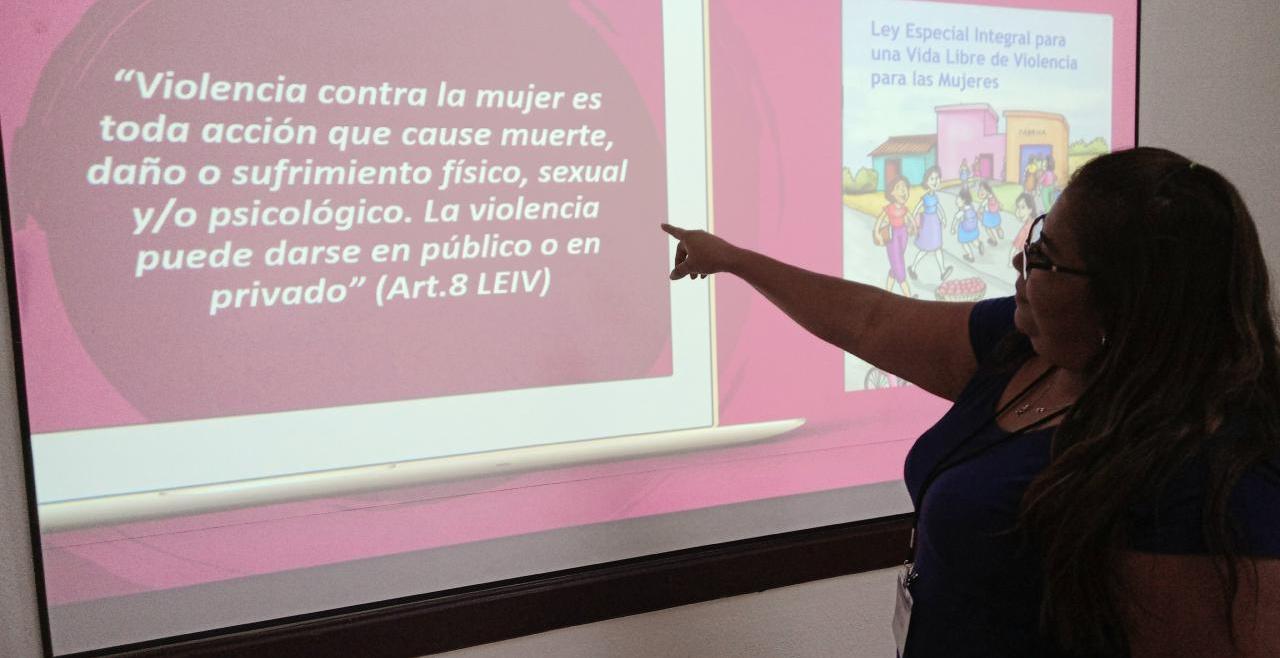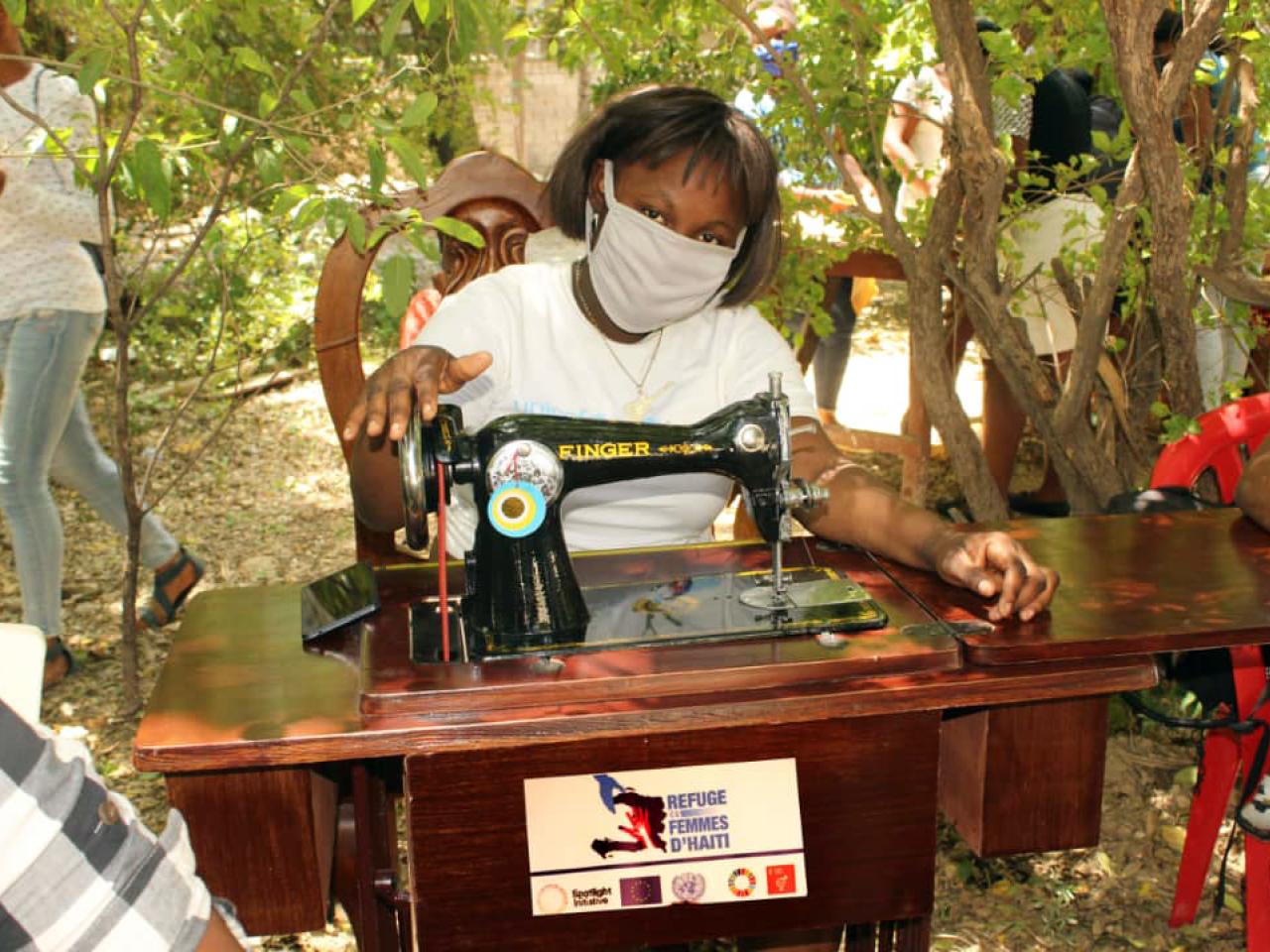"We need each other strong and empowered" - In El Salvador, women unite against violence

El Salvador - Standing in front of a group of 15 women sex workers, Reyna shares her own experience of a job that is highly stigmatized, but which allowed her to generate income to support her family.
"Everything has a before and an after," says Reyna. "Knowing our experiences, the rejection, stigma, violence and discrimination we face makes many people change their thinking towards us, that is why we need to talk about what we do and why we do it," she tells the audience. Reyna is participating in a Leadership and Empowerment Course coordinated by the United Nations Development Programme (UNDP) under Spotlight Initiative.
"Knowing our experiences - the rejection, stigma, violence and discrimination we face - makes many people change their thinking towards us." - Reyna, sex worker
Reyna is part of the "Orquídeas del Mar" collective, one of two groups attending the workshops. Women learn about different types of violence, how to file a complaint if they experience violence and the laws and policies that protect their rights. They also learned about the institutions that have victim assistance units and make recommendations to make services more accessible to sex workers.
Everyone in the group said they wanted to pass on the knowledge they had acquired about their rights and self-care, and to raise awareness in society to eliminate the discrimination they face because of their work.
"Speaking out is important, making ourselves heard and creating in society much more awareness about our work," says another of Reyna's colleagues.
Reyna became a sex worker more than 20 years ago out of economic necessity, when she was orphaned and left in charge of three younger siblings. For the past 10 years, she has been an advocate for the human rights of sex workers. She is also on her organization's board of directors, using her role to guide and support other women who are part of her collective. In addition, she is a mother to three daughters and a grandmother to two girls. For them and for other women, she is determined to be a force for change and support.
"I started working as a waitress and in various trades, but that did not generate much income. My siblings depended on me and the needs were many. I had no education and that made it difficult for me to get a good job. I had to make a decision and it was very hard for me at the time," she says.
At first, she hid the work she was doing from her family.
"It has not been easy to talk to my family, to tell them what work I do," she says, while also frankly recounting the violence she has faced on the streets. She remembers the day she was shot in her legs, an incident that means she now has difficulty walking.
Today, having more knowledge about her rights, the secrets are gone. She decided to talk to her daughters about her work and says that they respect it.
"I would be lying if I said they accepted it easily. With my eldest daughter, it was very hard. I say that you have to work with your children depending on their stage of life, talk to them, teach them not to discriminate, teach them to know the history, to see this as a form of work that generates income to live on," she emphasizes.
"The heart of this effort is that they value themselves, strengthen their self-esteem ... and recognize their abilities so that they can participate in organizational processes and be of help to other women." - Workshop trainer
Vulnerable populations such as sex workers and LGTBI groups face many barriers related to lack of access to social security, health services, resources and equal opportunities. Discriminatory social practices leave them increasingly behind.
For this reason, spaces for knowledge transfer, the building of networks and alliances and dialogue are necessary to sustain advocacy efforts and promote their human rights.
The "Orquídeas del Mar" and "Venus" collectives are participating in six workshops, whose main objective is to inform women sex workers of issues related to their rights, how to prevent gender-based violence, how to organize and to recognize their leadership and build self-esteem.
"For me, the heart of this effort is that they can value themselves, strengthen their self-esteem, take care of themselves and recognize their abilities so that they can consciously participate in organizational processes and be of help to other women in similar situations," explains the trainer in charge of the group.
"Our main limitation is the lack of recognition of sex work. This violates all of us, because in many instances we are not seen with respect," says Reyna. "They think I am not a woman with rights because of the work I do, but I am a woman sex worker and this practice generates income for me. With that, I cover my needs and those of my daughters and even generate other jobs - for example, I pay a person to take care of my daughters."
The central and transformative promise of the 2030 Agenda for Sustainable Development and its Sustainable Development Goals (SDGs), "Leave No One Behind," represents an unequivocal commitment to eradicate poverty in all its forms, end discrimination and exclusion, and reduce the inequalities and vulnerabilities that leave people behind and undermine the potential of humanity as a whole.
Within the framework of Spotlight Initiative, UNDP promotes partnerships with key actors such as civil society organizations, governments, justice sector institutions and academia in the fight against gender-based violence and discrimination.
Over the years, "we have learned to live with violence," says Reyna. "So we need to be strong, empowered and aware of our rights. We need to continue to expose these issues to society, to speak out, to sensitize new generations. This is a very valuable space."
Since 2017, Spotlight has been working to empower, promote and protect the rights of women and girls around the world with the goal of eliminating all forms of violence against women and girls by 2030.
Original story published in Spanish in November 2022.

